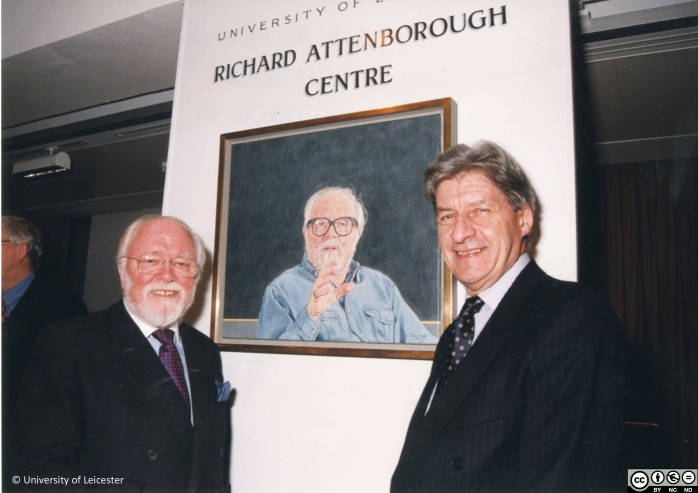Today marks what would have been Lord Richard Attenborough’s 100th birthday.
Born on 29 August 1923, Richard was the eldest of the three sons of Mary and Frederick Attenborough. He grew up on what is now the University of Leicester campus, during his father’s tenure as Principal of what was then University College, Leicester between 1932 and 1951. Richard attended Wyggeston Grammar School for Boys and became interested in the arts and acting at a young age, making his stage debut at Leicester’s famous Little Theatre in 1937. Following service for the Royal Air Force during the Second World War, he attended the Royal Academy of Dramatic Art in London, before going onto pursue a hugely successful and wide-ranging career in theatre and film.
Richard Attenborough and his wife Sheila Sim were two of the original cast members of Agatha Christie’s The Mousetrap which opened in 1952 at the Ambassadors Theatre and ultimately became the world’s longest running stage production.
Richard Attenborough earned his way to stardom as a film actor by starring in many now classic films such as Brighton Rock (1948), The Great Escape (1963) and Jurassic Park (1993). As a producer and director he was prolific, his seminal films including Oh! What a Lovely War (1969), Cry Freedom (1987) and Shadowlands (1993). He is perhaps best known for directing Gandhi (1982), which won 8 Academy awards including Best Director and Best Picture.
Alongside his artistic interests, Richard had a passionate belief in social justice and in widening access to arts and culture for everyone in society. From 1982 to 1985 he chaired the government-appointed Committee of Inquiry into the Arts and Disabled People, the first comprehensive review of the cultural provision for disabled people nationally. It concluded that accessible facilities were severely lacking and Lord Attenborough called for a purpose-built arts centre to be established.
Having led a campaign with local Leicester communities to raise funds for such an inclusive, multi-use arts venue, the Richard Attenborough Centre for the Arts and Disabled People was opened by Lord Attenborough and Princess Diana of Wales in a special ceremony on 27 May 1997 here at the University of Leicester. Since then the centre has been renamed twice: firstly as Embrace Arts and then to its current name, Attenborough Arts Centre. We are delighted that Michael Attenborough CBE continues the Attenborough family connection today, as our Patron.
Lord Attenborough remained a frequent visitor to and supporter of the University of Leicester throughout his life and was made an Honorary Distinguished Fellow, the University’s highest honour, in 2006.
As well as Lord Attenborough’s work in establishing Attenborough Arts Centre in Leicester, he was President of the Muscular Dystrophy campaign for 33 years, becoming the charity’s Honorary Life President in 2004. He was also the patron of the United World Colleges movement which established schools around the world, championing education that does not judge upon colour, race, creed or religion, including Waterford Kamhlaba United World College in Swaziland where he established the Sheila and Richard Attenborough Fine Arts Centre and the Jane Holland Centre for Creative Learning in memory of his daughter who perished, along with her daughter Lucy, in the 2004 Boxing Day tsunami. Lord Attenborough’s name is also given to the Attenborough Centre for the Creative Arts at the University of Sussex, after his former role as Chancellor of the University.
Lord Attenborough was an important figurehead and champion for the arts and the principles he held continue to be relevant today. In his maiden speech in the House of Lords in 1994, Lord Attenborough said:
‘From the very earliest of times the arts have been an instinctive essential of our humanity. They are a miraculous sleight of hand which reveal the truth and a glorious passport to greater understanding between the peoples of the world. The arts not only enrich our lives but grant us the opportunity to challenge accepted practices and assumptions. They give us a means of protest against that which we believe to be unjust; a voice to condemn the brute and the bully; a brief to advocate the cause of human dignity and self-respect…’
Today, as we celebrate the life of our founder on the centenary of his birth, we continue to take inspiration from his work and belief in social justice. We stay true to his vision by removing barriers to participation for those who face them, broadening access to culture and creativity for all. We prioritise giving platforms to those who are often not heard or represented, enabling them to express their ideas and tell their stories. Above all, we continue in the belief that – in the words of Lord Attenborough:
‘Art is not an elitist gift for a few select people. Art is for everyone.’
Lord Richard Attenborough’s values remain ever pertinent to contemporary times, and we will continue to honour his important legacy.
Andrew Fletcher, Director of Attenborough Arts Centre
You can watch Arena: The Many Lives of Richard Attenborough on BBC iPlayer, a documentary about Lord Attenborough’s life made in 2003, which features Attenborough Arts Centre.
